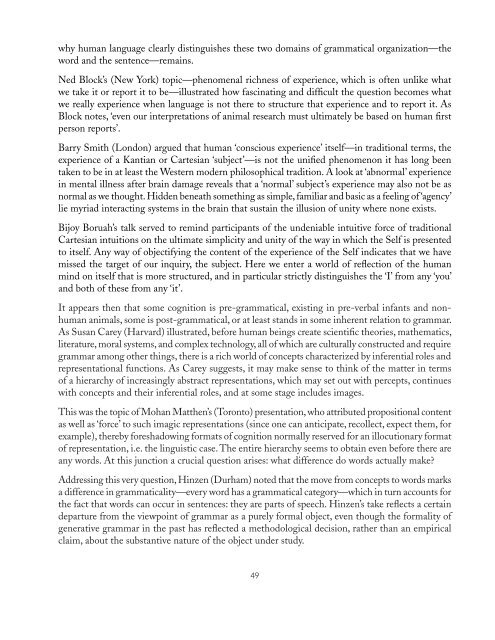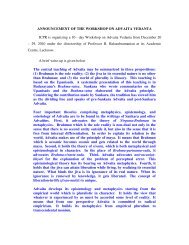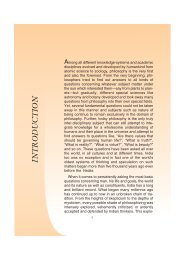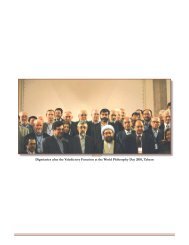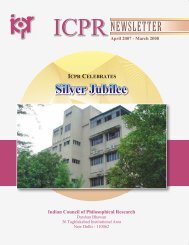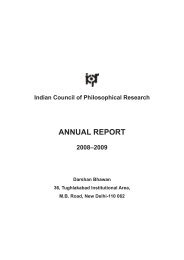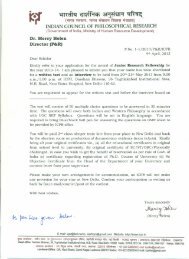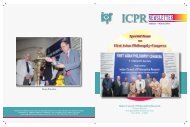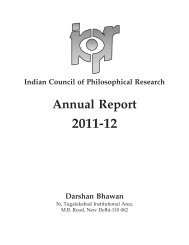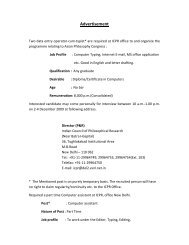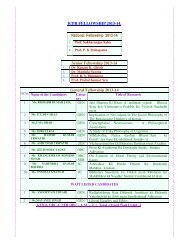(2010- 2011) English - Indian Council of Philosophical Research
(2010- 2011) English - Indian Council of Philosophical Research
(2010- 2011) English - Indian Council of Philosophical Research
You also want an ePaper? Increase the reach of your titles
YUMPU automatically turns print PDFs into web optimized ePapers that Google loves.
why human language clearly distinguishes these two domains <strong>of</strong> grammatical organization—the<br />
word and the sentence—remains.<br />
Ned Block’s (New York) topic—phenomenal richness <strong>of</strong> experience, which is <strong>of</strong>ten unlike what<br />
we take it or report it to be—illustrated how fascinating and difficult the question becomes what<br />
we really experience when language is not there to structure that experience and to report it. As<br />
Block notes, ‘even our interpretations <strong>of</strong> animal research must ultimately be based on human first<br />
person reports’.<br />
Barry Smith (London) argued that human ‘conscious experience’ itself—in traditional terms, the<br />
experience <strong>of</strong> a Kantian or Cartesian ‘subject’—is not the unified phenomenon it has long been<br />
taken to be in at least the Western modern philosophical tradition. A look at ‘abnormal’ experience<br />
in mental illness after brain damage reveals that a ‘normal’ subject’s experience may also not be as<br />
normal as we thought. Hidden beneath something as simple, familiar and basic as a feeling <strong>of</strong> ‘agency’<br />
lie myriad interacting systems in the brain that sustain the illusion <strong>of</strong> unity where none exists.<br />
Bijoy Boruah’s talk served to remind participants <strong>of</strong> the undeniable intuitive force <strong>of</strong> traditional<br />
Cartesian intuitions on the ultimate simplicity and unity <strong>of</strong> the way in which the Self is presented<br />
to itself. Any way <strong>of</strong> objectifying the content <strong>of</strong> the experience <strong>of</strong> the Self indicates that we have<br />
missed the target <strong>of</strong> our inquiry, the subject. Here we enter a world <strong>of</strong> reflection <strong>of</strong> the human<br />
mind on itself that is more structured, and in particular strictly distinguishes the ‘I’ from any ‘you’<br />
and both <strong>of</strong> these from any ‘it’.<br />
It appears then that some cognition is pre-grammatical, existing in pre-verbal infants and nonhuman<br />
animals, some is post-grammatical, or at least stands in some inherent relation to grammar.<br />
As Susan Carey (Harvard) illustrated, before human beings create scientific theories, mathematics,<br />
literature, moral systems, and complex technology, all <strong>of</strong> which are culturally constructed and require<br />
grammar among other things, there is a rich world <strong>of</strong> concepts characterized by inferential roles and<br />
representational functions. As Carey suggests, it may make sense to think <strong>of</strong> the matter in terms<br />
<strong>of</strong> a hierarchy <strong>of</strong> increasingly abstract representations, which may set out with percepts, continues<br />
with concepts and their inferential roles, and at some stage includes images.<br />
This was the topic <strong>of</strong> Mohan Matthen’s (Toronto) presentation, who attributed propositional content<br />
as well as ‘force’ to such imagic representations (since one can anticipate, recollect, expect them, for<br />
example), thereby foreshadowing formats <strong>of</strong> cognition normally reserved for an illocutionary format<br />
<strong>of</strong> representation, i.e. the linguistic case. The entire hierarchy seems to obtain even before there are<br />
any words. At this junction a crucial question arises: what difference do words actually make<br />
Addressing this very question, Hinzen (Durham) noted that the move from concepts to words marks<br />
a difference in grammaticality—every word has a grammatical category—which in turn accounts for<br />
the fact that words can occur in sentences: they are parts <strong>of</strong> speech. Hinzen’s take reflects a certain<br />
departure from the viewpoint <strong>of</strong> grammar as a purely formal object, even though the formality <strong>of</strong><br />
generative grammar in the past has reflected a methodological decision, rather than an empirical<br />
claim, about the substantive nature <strong>of</strong> the object under study.<br />
49


